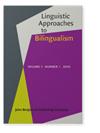Foreign accent in L1 (first language)
IF 1.8
2区 文学
0 LANGUAGE & LINGUISTICS
引用次数: 0
Abstract
This study builds on Flege et al. (2006) and evaluated the influence of chronological age and length of residence in North America on degree of foreign accent in first language (L1) Korean by Korean adults and children in immigrant settings. The adult (A4/6) and child (C4/6) immigrants lived in the host countries for 4 or 6 years, respectively. Their Korean utterances were compared to those of age-matched controls in Seoul, Korea. The purpose was to examine the cross-linguistic influence of English on the degree of foreign accent in L1 Korean by the immigrants. Eighteen native-speaking judges rated four Korean utterances for overall degree of perceived foreign accent. Both adult and child immigrants were more strongly foreign accented than the controls. However, (1) stability of L1 Korean was greater (less foreign-accented) for the adult than child immigrants; and (2) there was no significant difference between the A4 and A6, and C4 and C6 groups. This suggests that by the time the Korean immigrants lived in North America for four years, they have diverged audibly from the predominantly monolingual speakers in Seoul. The results have implications for L1 maintenance/attrition and plasticity in spoken language processing.1(第一语言)外国口音
本研究建立在Flege等人。(2006),并评估了移民环境中韩国成年人和儿童在北美的实际年龄和居住时间对第一语言(L1)韩语外国口音程度的影响。成年移民(A4/6)和儿童移民(C4/6)分别在东道国生活了4年或6年。他们的朝鲜语与韩国首尔的同龄人进行了比较。本研究的目的是考察英语对移民一级韩语外国口音程度的跨语言影响。18位母语为韩语的评委对四种韩语话语的外国口音整体感知程度进行了评分。成年移民和儿童移民的外国口音都比对照组强烈。然而,(1)成年移民的L1韩语的稳定性高于儿童移民(较少带有外国口音);(2)A4组和A6组、C4组和C6组之间无显著差异。这表明,当韩国移民在北美生活了四年时,他们已经与首尔以单语为主的人产生了明显的分歧。研究结果对口语加工中L1的保持/损耗和可塑性具有启示意义。
本文章由计算机程序翻译,如有差异,请以英文原文为准。
求助全文
约1分钟内获得全文
求助全文
来源期刊

Linguistic Approaches To Bilingualism
Social Sciences-Linguistics and Language
CiteScore
3.20
自引率
9.10%
发文量
24
期刊介绍:
LAB provides an outlet for cutting-edge, contemporary studies on bilingualism. LAB assumes a broad definition of bilingualism, including: adult L2 acquisition, simultaneous child bilingualism, child L2 acquisition, adult heritage speaker competence, L1 attrition in L2/Ln environments, and adult L3/Ln acquisition. LAB solicits high quality articles of original research assuming any cognitive science approach to understanding the mental representation of bilingual language competence and performance, including cognitive linguistics, emergentism/connectionism, generative theories, psycholinguistic and processing accounts, and covering typical and atypical populations.
 求助内容:
求助内容: 应助结果提醒方式:
应助结果提醒方式:


